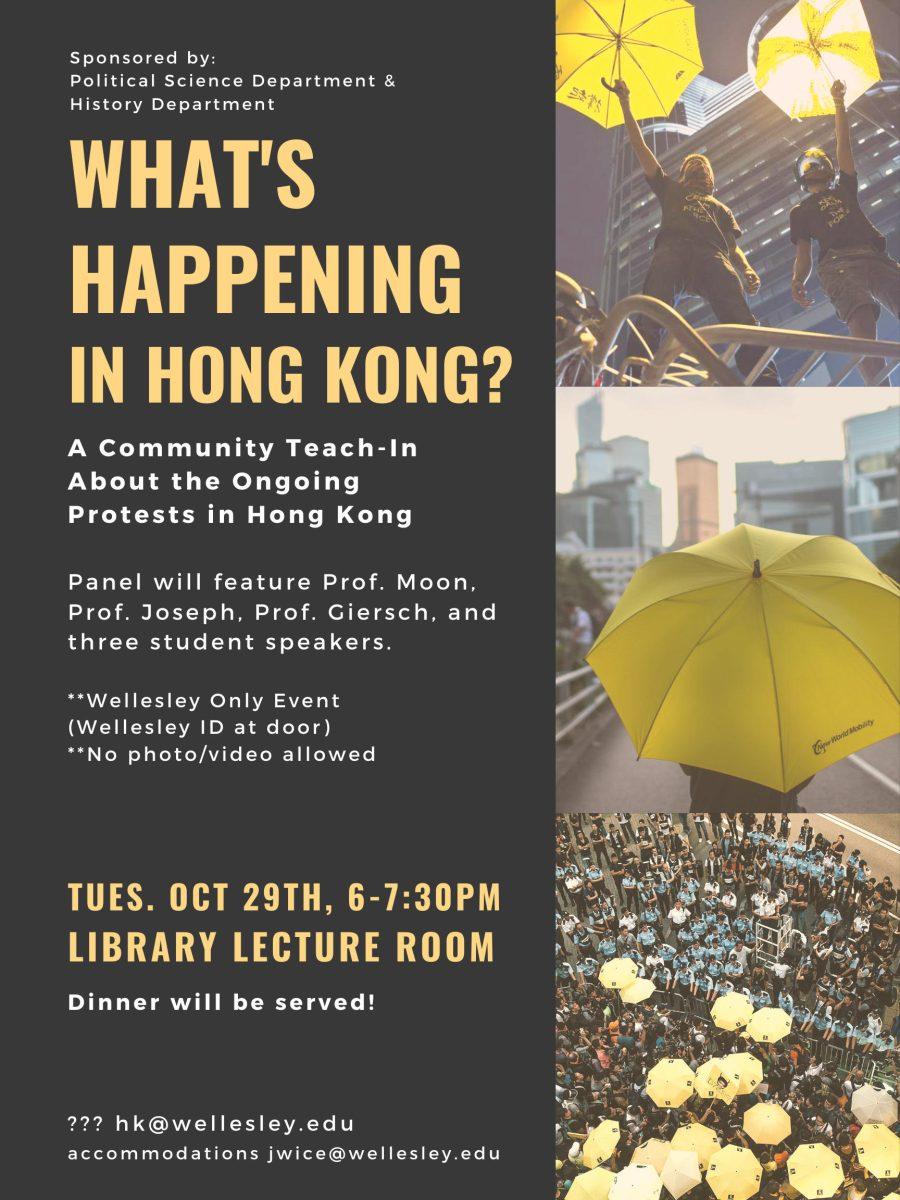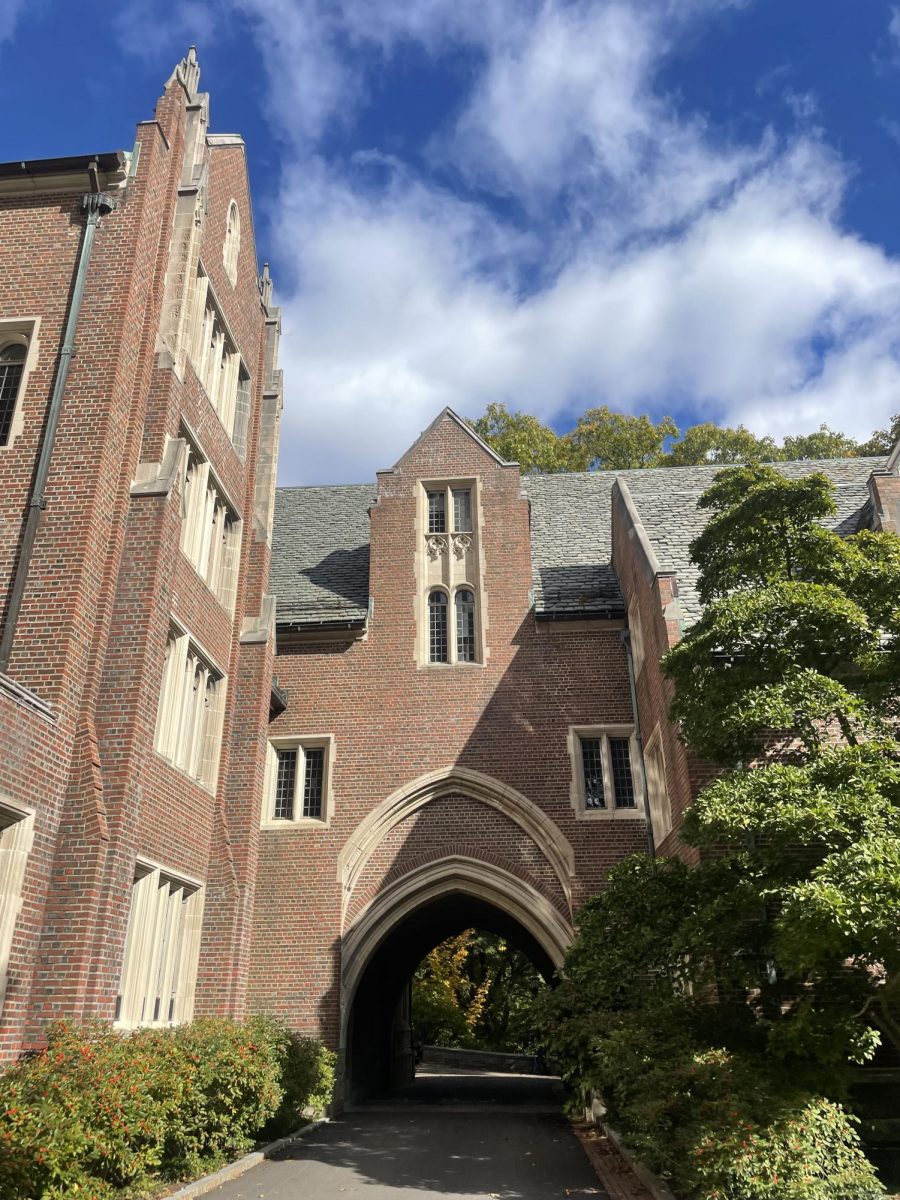On Oct. 29, students packed the library lecture room for an event called “What’s going on in Hong Kong?” The event was led by a group of three students, two of whom are from Hong Kong and another who has spent extensive time working there. The three students asked to be anonymous in this article due to fears of retribution from the governments of countries in the region. Over 100 students, professors and staff members attended the event, which enforced a strict no-photos, no-videos policy.
Along with the three students, Professors Kathy Moon of the political science department, C. Pat Giersch of history and William Joseph of political science took part. Kathy Moon served as the moderator.
By the time of the panel, the protests in Hong Kong had been ongoing for about five months. They began, as the panelists explained, as protests against a bill that would allow Hong Kong citizens who have committed a criminal offense in another country to be extradited to China. To many Hong Kong people, this looked like an overreach of power on the part of the People’s Republic of China, attempting to subject the region to mainland China’s legal system and take away the specific set of civil liberties that are currently afforded to Hong Kong. While Hong Kong is currently expected to be fully integrated into China in 2047, the region exists under the “one country, two systems” principle established by Deng Xiaoping, which means that while Hong Kong is to some degree part of China, it maintains its own administrative and economic system.
Professor Giersch emphasized on the panel that these protests should be contextualized within a deep history of anti-government protest in East Asia. “This is not unique to Hong Kong … much of East Asia has a tradition of young students as a political and moral compass of society,” he said. Giersch listed youth uprisings over the past several decades in places like mainland China, Japan and South Korea as examples. He noted that there are currently two prevailing narratives regarding Hong Kong: the first being that the Chinese Communist Party (CCP) wants oppression while Hong Kong and the United States want freedom, and the second being that Hong Kong wants to be part of China and imperialist outsiders are intervening to undermine that.
One anonymous student on the panel agreed with Giersch’s worries about overly simplistic narratives. “Given the colonial past of Hong Kong, I think the protests can easily be simplified as an active resistance against the CCP and Hong Kongers’ desire to cling on to the Western model of democracy, especially given the protesters’ appeal to Western power,” she said. “However, I think that undermines the autonomy of the Hong Kong people and just movements in Asia in general because it portrays them as merely followers of Western movements when there are a lot of nuances, innovations and subtleties that the protesters have had to deal with.”
Another student spoke about how many people participated in the protests. On June 16, for example, two out of seven residents of Hong Kong marched in the streets. In addition, businesses have been ‘choosing sides’ in the conflict, with pro-CCP businesses, often those who cannot afford to lose business on the mainland, being boycotted by protesters, while those businesses who show support to the protesters risk losing mainland support.
This issue is of particular importance on Wellesley’s campus, the students noted, because of how high our population of students from Hong Kong is — last year, Hong Kong students made up the fifth-highest number of students from any territory outside of the United States. “Considering that a large chunk of the Wellesley population or their parents are from Hong Kong, China and Taiwan, I think it is important to have a more nuanced view of what is happening other than Western media,” a student on the panel pointed out. Students from those places together make up over a third of international students at Wellesley.
“There are places other than America that matter too!” said another student who organized the event. “I also think having Hong Kong students at the event give people pretty unique perspectives on the entire situation. I feel like it’s easy to reduce this to a neoliberal sort of narrative, but the entire situation is so much more complex than that.”
The students noted that there has not been any official Wellesley community response to the protests, even though the safety of the families and friends of a large portion of our student body is at stake. One student described the emotional toll of trying to go about school normally while watching news reports of police violence at home. “Hong Kong is my home,” she said. “Cantonese is my mother tongue, I know how to go from place to place without using Google Maps and I’d have siumai every day if I could. My family still lives there and a lot of my friends either attend local universities or work there. I live in constant fear that people I know will get hurt — many already have.”
A Wellesley senior who spoke on the panel said that she wishes officials at the College would do more to check in on students who are affected by the protests. Though she said that individual professors, particularly those that work in areas related to East Asian issues, have been supportive, there has been no official acknowledgement of how this issue may be affecting students. “With the exception of Slater sending out a travel advisory at the end of August when blockades at the Hong Kong International Airport were happening … student life has not reached out,” she said. The Hong Kong alumnae club, which has access to records of current students from Hong Kong at Wellesley has not reached out. “I knew that senior year was going to be a difficult year even without the protests, but constantly worrying over family members and the political situation has complicated things a lot,” she said. Many of her family members either work in public hospitals or attend university, which have both been sites of police scrutiny. “Another family member just got tear-gassed this past weekend, so it’s fair to say that the ongoing protests have impacted me on a personal level … given that this is a four — now going on five — month conflict that does not show any signs of dying down soon, I would have appreciated literally any person from student life reaching out privately, even if the message was just boilerplate text with a list of available resources.”






